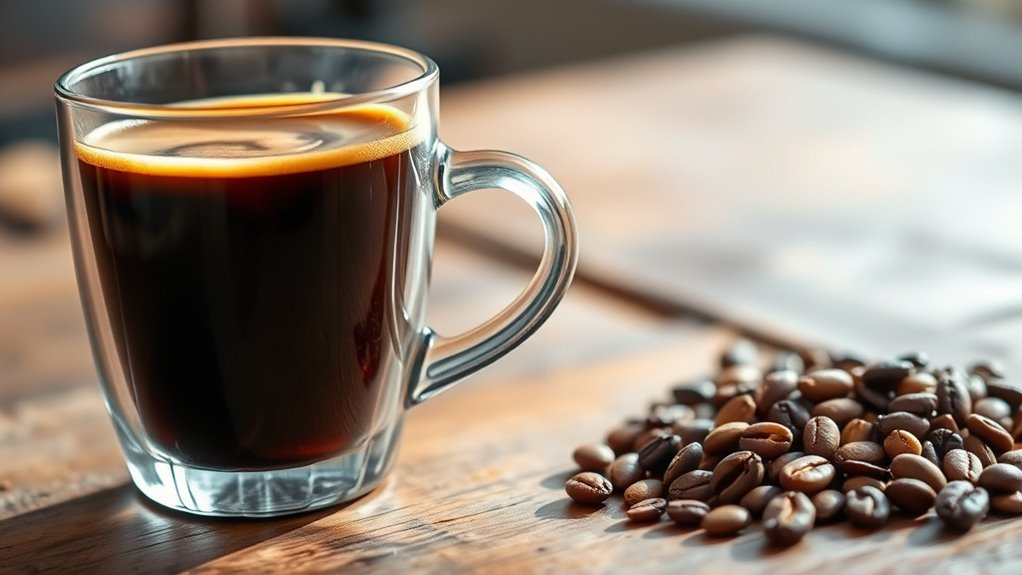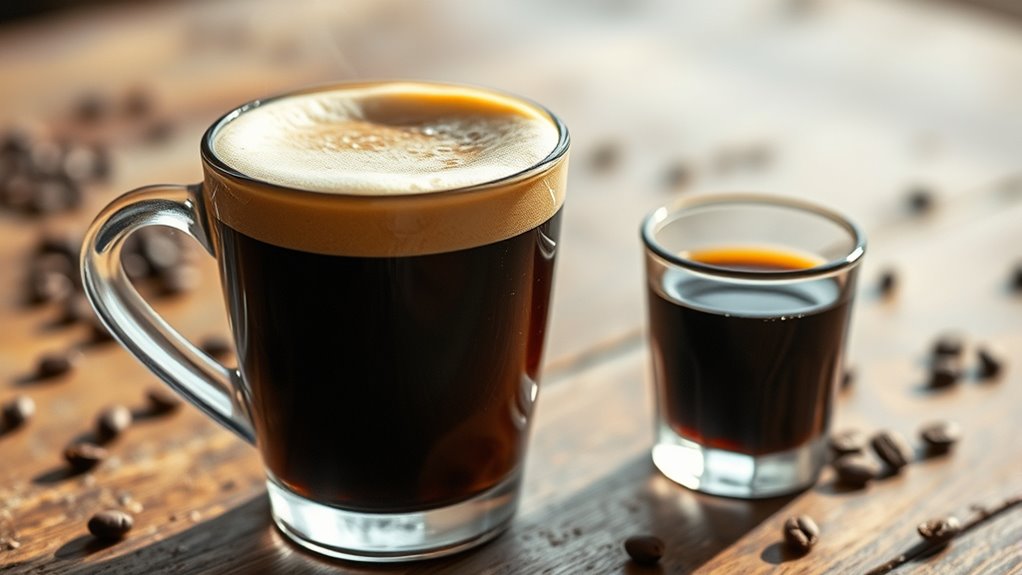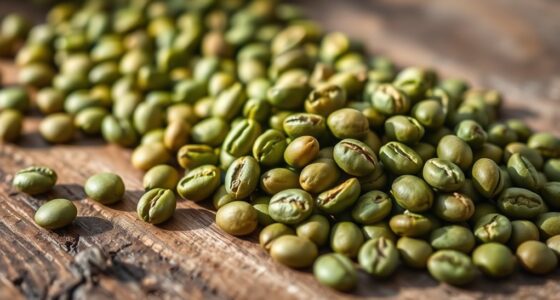Many believe all coffee or energy drinks contain the same amount of caffeine, but that’s a myth. In reality, caffeine levels vary widely based on drink type, brewing method, and serving size. For example, an 8 oz coffee has about 95 mg, while energy drinks can have over 300 mg per can. Knowing these facts helps you manage your intake better and avoid surprises. Keep exploring to understand how caffeine content truly differs across beverages and brands.
Key Takeaways
- Actual caffeine levels vary widely by beverage type, brewing method, and serving size, contrary to common assumptions.
- Energy drinks can contain from 60 to over 300 mg of caffeine per serving, often leading to misconceptions about their strength.
- Labels may not always accurately reflect caffeine content, so awareness is essential for managing intake.
- A standard 8 oz cup of coffee typically has about 95 mg, but this can fluctuate based on preparation and beans.
- Moderate caffeine consumption is generally safe, but individual sensitivity varies, emphasizing the importance of personalized intake awareness.

Ever wonder how much caffeine you’re consuming from your favorite beverages? Understanding caffeine content can help you make informed choices about your daily intake. The caffeine amounts in common drinks vary considerably, influenced by factors like brew method, beverage caffeine levels, and standard serving size.
Curious about your caffeine intake? Knowing beverage caffeine levels helps you make smarter daily choices.
For example, a typical 8 oz cup of brewed coffee contains around 95 milligrams of caffeine, but this can fluctuate based on the type of beans used, roast level, and brewing technique. A drip coffee brewed with a strong method may have more caffeine, while a lighter brew could have less. Similarly, espresso shots pack about 40 milligrams of caffeine per 1 oz serving, making them a concentrated source of caffeine. The brew method directly impacts caffeine variability, so two espressos could differ slightly in caffeine content depending on extraction time and grind size.
Black tea provides roughly 47 milligrams of caffeine per 8 oz cup, but steeping time and tea leaf quality substantially influence these levels. Longer steeping or using high-quality leaves can increase caffeine content, while shorter steeping reduces it. Beverages like energy drinks demonstrate even greater variability, with caffeine amounts ranging from 60 to over 300 milligrams per 16 oz can. The formulation and brand largely determine this variation, and some energy drinks are designed to deliver a potent caffeine punch, making it essential to check labels carefully.
Meanwhile, a standard 12 oz can of soda contains around 40 milligrams of caffeine, primarily from added flavorings and processing. While soda might seem less potent, its caffeine content still contributes to your daily total, especially if you consume multiple cans.
Caffeine variability is a critical aspect to contemplate because the same beverage can have different caffeine levels depending on preparation and brand. For example, the caffeine content in coffee depends heavily on the brew method—whether you use a French press, drip machine, or pour-over. Each method extracts different amounts of caffeine, affecting the overall caffeine levels in your cup. Recognizing these differences helps you manage your intake more accurately.
Always pay attention to serving sizes, as larger servings naturally contain more caffeine. Being aware of these factors allows you to balance your consumption, avoid overdoing it, and understand that not all beverages labeled as “coffee” or “tea” are created equal in caffeine content. In essence, knowing the caffeine variability across various drinks helps you stay informed and in control of your caffeine consumption. Additionally, understanding caffeine variability can aid in selecting beverages that align with your health goals and sensitivities.
Frequently Asked Questions
What Are the Alarming Facts About Caffeine?
You should know that consuming too much caffeine can be alarming. It may cause mineral loss, weaken your bones, and lead to severe health issues like rapid heartbeat, high blood pressure, anxiety, and insomnia.
Overdoing it with energy drinks or pills can result in caffeine poisoning, which is life-threatening.
You might also experience withdrawal symptoms like headaches, fatigue, and trouble concentrating if you suddenly cut back.
What Is Unhealthy About Caffeine?
You should know that caffeine can be unhealthy if you consume too much. It might cause you to lose minerals, weaken your bones, and lead to anxiety, insomnia, or a rapid heartbeat.
High doses can also make you dependent, with withdrawal symptoms when you cut back.
Pregnant women should especially watch their intake, as excessive caffeine increases risks like miscarriage and low birth weight.
Moderation is key to avoid these health issues.
What Is the Dirty Little Secret About Caffeine?
The dirty little secret about caffeine is that its effects vary greatly from person to person. You might think it’s safe or harmless, but individual genetics, health, and how much you consume influence your response.
Many don’t realize processed caffeine products like energy drinks can contain dangerously high doses. Overdoing it can lead to dependence, withdrawal, or health issues, especially if you underestimate the true caffeine content in your beverages.
Why Is Caffeine Controversial?
You might wonder why caffeine sparks controversy. It’s because, despite its popularity, many worry about its health risks, dependence, and effects on sensitive groups like pregnant women and kids.
While moderate intake is generally safe, some studies link high consumption to issues like anxiety and sleep problems.
Misinformation and individual differences make it hard to set clear guidelines, fueling ongoing debates about caffeine’s true safety and long-term effects.
Conclusion
Now that you know the facts about caffeine, you can enjoy your favorite drinks without the misconceptions. Remember, moderation is key to avoiding negative effects, and everyone’s sensitivity varies. By understanding the true caffeine content in various beverages, you make smarter choices for your health and energy levels. So, sip wisely and stay informed—your body will thank you for it. Cheers to enjoying caffeine responsibly!









